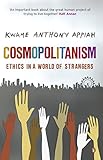
Cosmopolitanism: Ethics in a World of Strangers
- 作者: Kwame Anthony Appiah
- 出版社/メーカー: Penguin
- 発売日: 2007/11/01
- メディア: ペーパーバック
- クリック: 4回
- この商品を含むブログ (7件) を見る
Kwame Anthony Appiah Cosmopolitanism: Ethics in a World of Strangers Penguin Books, 2007を買う。
裏表紙のコピーから引用;
また、『ガーディアン』のレヴュー;
We are increasingly accustomed to think of mankind as divided between warring creeds, separated from one another by chasms of incomprehension. In Cosmopolitanism Kwame Anthony Appiah, one of the world's leading philosophers, challenges us to redraw these imaginary boundaries.
Reviving the ancient philosophy of Cosmopolitanism as a means of understanding the complex world of today, Appiah argues we concentrate too much on what makes us different rather than recognizing our common humanity. Cosmopolitanism confronts our preconceptions about Us and Them and aims to change the way we think. It is a moral manifesto for a planet of strangers.
No pepper todaySophie Botros finds Cosmopolitanism, Kwame Anthony Appiah's optimistic account of facts and values, a refreshing antidote to today's scare-mongering pessimism
Sophie Botros
Saturday August 26, 2006Guardian
Cosmopolitanism: Ethics in a World of Strangers
by Kwame Anthony Appiah
196pp, Allen Lane, £16.99Prehistoric hunter-gatherers encountered fewer people in a lifetime than we would on a single day walking down New York's Fifth Avenue. Though their world of isolated clans shaped our natures, we live in a world where our most trivial deeds can affect unknown millions on the other side of the globe. Kwame Anthony Appiah, an Anglo-Ghanaian philosophy professor based at Princeton, proposes two principles to enable us to cope with this situation. We are, he asserts, responsible for every other human being. This may seem vapid - the kind of pious over-statement beloved of international organisations. But Appiah takes it seriously, and tries to impose realistic limits on an apparently open-ended duty.
By refusing to equate not saving a person with killing him, except where propinquity places us in a special relationship to his death, Appiah argues that we are not obliged to give all our material wealth to aid the third world. He thinks it may seem shocking that he defends going to the opera when children are dying. According to him, we can do most good not by depriving ourselves of pleasures, but by pondering on the root causes of these ills, and influencing larger policy decisions.
Appiah's second principle advocates "universal concern and respect for legitimate difference". This raises the question of how we are to respect cultural diversity and yet not condone cruel and barbarous social practices, such as the stoning of an adulteress. Can Appiah prevent his cosmopolitanism from degenerating into an "anything goes" morality? Relativism, he tells us, arises out of a scientific view that sharply distinguishes facts from values. Facts, on this view, are out there in the world, and since there is only one world, our beliefs are true when they correspond with the facts. Values are merely matters of taste and so immune from rational criticism: if stoning an adulteress is regarded as good by certain societies, it is good for them.
Appiah resists this conclusion by arguing that values are more tethered to reason than is here allowed. We do not learn that kindness is good, or cruelty evil, by experience as we learn that chocolate is nice. Goodness is integral to kindness, and evil to cruelty, so that in grasping these concepts we recognise that we all have good reason to be kind, and to abhor cruelty. It is because we value kindness that we want people to be kind, not the other way around.
But don't values still fall short of the standard of rationality by which we measure beliefs? Appiah replies that even a person's beliefs are only rational relative to the beliefs he already possesses. It is no more irrational for a member of the Asante clan to believe that his aunt's illness is caused by her daughter-in-law's witchcraft than for a person in Manhattan to believe that a virus is responsible. The westerner does not see viruses invading cells any more than the Asante sees witches producing their malign effects. When scientists looked at photographs of cloud chambers they saw fuzzy lines which it was rational to interpret as the paths of electrons only because of prior theoretical beliefs. Appiah concludes that "you can't get into the game of belief by starting from nothing". However, he rejects the view that we cannot adjudicate between beliefs in witchcraft and viruses. The former, he declares, are false, the latter true; the theories and ideas of science are "far superior" to those of pre-scientific societies. By Appiah's own reckoning, this judgment is rational only relative to the beliefs he already possesses. Surely, if these beliefs are scientific, he is begging the question in favour of science, and his retreat from relativism is blocked.
Drawing vividly upon his experiences of growing up in Ghana, Appiah argues that moral and religious disagreement between cultures is overstated. It will seem less strange that in Akan society a woman's eldest brother assumes the role of father to her children when we realise that his conduct is assessed by the same criteria as a father's in our society. Taboos, such as that against eating red pepper on Wednesdays, cannot be brought under familiar moral principles, but we know what it is like to feel polluted.
Aspects of western culture - radios, Coca-cola, a passion for football - have spread to remote Ghanaian villages, and so aid mutual understanding. Where disagreements are real, it is rarely a problem unique to cosmopolitanism since they also occur - consider the controversy over homosexuality - within societies. Conflicts sometimes arise because we share the same value: Palestinians and Israelis clash over Jerusalem because they prize it equally. Appiah will perhaps be accused of underestimating the gulf of incomprehension that exists between fundamentalists of different religious persuasions, but his sensible optimism is a refreshing antidote to today's scare-mongering pessimism.
· Sophie Botros is the author of Hume, Reason and Morality: A Legacy of Contradiction (Routledge).
http://books.guardian.co.uk/print/0,,329561169-110738,00.html

- 作者: 粉川哲夫
- 出版社/メーカー: 岩波書店
- 発売日: 1991/06/12
- メディア: ハードカバー
- 購入: 1人 クリック: 5回
- この商品を含むブログ (4件) を見る
ちょうど天皇の代替わりを挟んだ所謂バブルの後期の頃の東京ルポ。未だグローバル化という言葉が殆ど現われていなかった頃の話。「あとがき」から、この本の元になった文章が『世界』に連載されていた時の担当編集者が小熊英二であることを知る。粉川氏曰く、
東京ジェントリフィケーション
エスニック・ストリート
エスニック料理の行方
都市のギャラリー化とギャラリーの商店化
首狩り族の活躍
国際度の傾向的低下の法則
ポスト情報化社会のためのパーティー
官際と民際のはざまで
日本主義の輸出
空虚な広場
鳥居のある資本主義
出島の博覧会
落書きの沈黙
自転車に乗った出稼ぎ女性たち
権利としての「無国籍」と「無戸籍」
不良外人の誘惑
うさんくささの活用
秋葉原サイズのニッポン
難民の保税制度あとがき
1980年代後半に、「国際化」とは裏腹に日本への「帰化許可者」数が微減傾向にあったことが指摘されているのは興味深かったということを書き添えておく(p.163)。
彼は、その第一印象とはうらはらに、頑張りと寝業の人だった。二年半にわたる連載のあいだ小熊さんは、一度も欠かさず取材に同伴し、なぜか首から荷造りヒモでつるしてあるカメラで記録写真を撮ってくれた(その一部は、本書で使わせてもらった)。(p.216)
ところで、粉川さんの〈都市論〉でいちばん面白いのは、1989年に出た『都市の使い方』であろう。粉川氏(ほぼ)唯一の爆笑の書。

- 作者: 粉川哲夫
- 出版社/メーカー: 弘文堂
- 発売日: 1989/05
- メディア: 単行本
- クリック: 4回
- この商品を含むブログ (3件) を見る